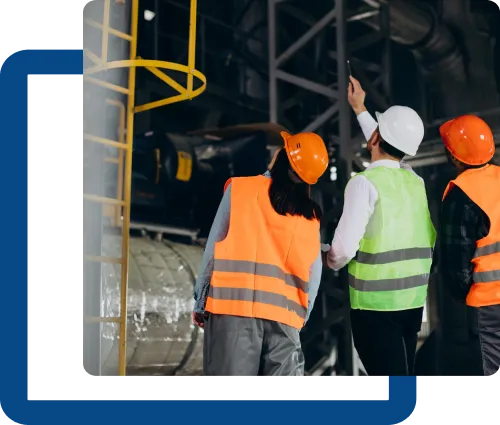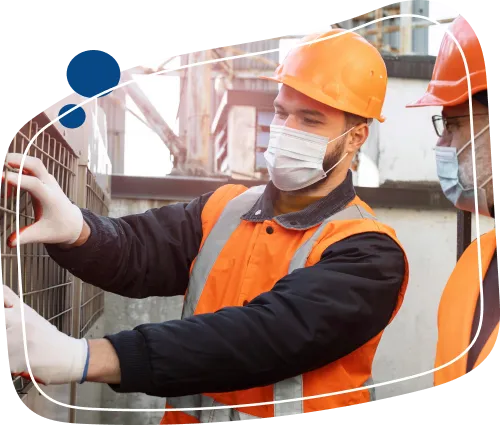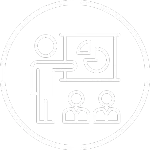Now Offering Spanish Safety Training!

Now Offering Spanish Safety Training!
Construction Safety
Mobile Equipment Training
FSDAVCFEBFEVSDDVFSD
FSDAVCFEBFEVSDDVFSD
FSDAVCFEBFEVSDDVFSD
Construction Safety - Mobile Equipment Training
Training for Safe Mobile Equipment Operations

Mobile equipment training equips operators with essential skills for handling heavy machinery safely on construction sites. The training focuses on safe driving, proper load management, and emergency response techniques, reducing accidents and ensuring worker safety.
The program covers various equipment types, including forklifts, cranes, and loaders, tailored to the specific needs of job sites. It also emphasizes strict adherence to OSHA regulations, enhancing workers' understanding of safety protocols. Regular training updates keep workers informed about best practices and changing safety standards, promoting a safer work environment across all projects.

Mobile Operator Safety Training Programs
Operator training plays a vital role in reducing risks associated with mobile equipment on construction sites. Effective training ensures that operators can identify hazards, understand equipment limits, and implement safe handling practices. This proactive approach not only minimizes accidents but also helps maintain site productivity.
Incorporating practical exercises into the training enhances understanding and builds confidence among workers. By simulating real-life scenarios, operators can learn how to respond effectively to challenges, such as load shifts or unexpected terrain changes. To further strengthen safety measures, integrating forklift safety training into the program ensures comprehensive knowledge of operating guidelines.
Regular assessments ensure that operators retain critical skills and remain up-to-date with the latest safety protocols. Feedback from these evaluations helps trainers adjust the content to match evolving site conditions. This ongoing process keeps workers well-prepared for their roles, reinforcing a culture of safety across construction sites. By continuously adapting training, teams can address emerging risks effectively, reducing workplace incidents.
Developing Safety Skills as a Mobile Equipment Operator

Mobile equipment training goes beyond basic safety, focusing on specialized skills like load balancing, operating in confined spaces, and safe lifting techniques. These advanced skills help operators handle diverse challenges on construction sites. Organizing for safety further encourages proactive hazard management, fostering a confident workforce ready to address risks effectively.
The training combines classroom learning with practical exercises, allowing operators to master the technical aspects of various equipment, such as forklifts, cranes, and loaders. This mixed approach ensures that workers not only understand safety protocols but can also apply them in real-world scenarios. Consistent engagement through diverse training methods boosts retention, leading to better implementation of safety measures. This focus on skill-building keeps workers prepared for changing site conditions and safety requirements, enhancing overall operational safety.

Periodic refresher courses are vital for keeping operators updated on new safety protocols and equipment advancements. These courses offer a platform for workers to share experiences, propose safety enhancements, and discuss challenges faced on-site. This collaborative approach helps maintain training relevance and effectiveness. Incorporating workplace safety training in Charlotte into refresher courses supports consistent safety standards across projects, reducing potential risks and fostering compliance.
Open communication between trainers and operators is crucial for sustaining safety standards. Encouraging feedback during refresher sessions allows trainers to adapt protocols to changing site conditions. This dialogue not only promotes a proactive approach to safety but also ensures that protocols remain practical and applicable. As workers participate actively, they become better prepared for evolving construction challenges, supporting a safer, more resilient work environment.
Frequently Asked Questions
Frequently Asked Questions
What types of mobile equipment does the training cover, and is it suitable for all levels of operators?
The training covers a wide range of mobile equipment commonly used in construction, including forklifts, cranes, and earthmoving machinery. It is designed to accommodate all levels of operators, from beginners to experienced personnel, ensuring everyone gains valuable knowledge and skills for safe operation.
How does Mobile Equipment Training by Nain and Associates ensure compliance with OSHA standards?
Our program is meticulously designed to meet and exceed OSHA standards for the safe operation of mobile equipment. We focus on comprehensive safety protocols, including pre-operation inspections, operational safety practices, and emergency procedures, ensuring your team is well-prepared and compliant.
Can the training be customized to address the specific needs and risks of our construction site?
Yes, we tailor our Mobile Equipment Training to the specific needs of your site and equipment. This customization ensures that your team receives relevant and practical training, focusing on the unique challenges and risks associated with your construction environment.
What is the format of the training, and how long does it typically take to complete?
The training combines theoretical instruction with practical, hands-on exercises, providing a well-rounded learning experience. The duration can vary depending on the equipment and specific needs of your team, but typically it ranges from a single day to several days for more comprehensive coverage.
How will this training impact the overall safety culture and productivity of our construction projects?
By equipping your team with the knowledge and skills for safe equipment operation, you'll not only reduce the risk of accidents and injuries but also enhance operational efficiency. This training fosters a safety-first mindset among your workforce, contributing to a stronger safety culture and improved productivity on your projects.
Strengthening Operator Safety through Regular Assessments
Routine evaluations play a key role in maintaining high safety standards for mobile equipment operators. These assessments involve reviewing safety protocols, equipment handling techniques, and operator performance. By identifying potential gaps, teams can address issues promptly, reducing risks on-site.
Engaging operators in these evaluations fosters a sense of accountability. Open discussions about recent incidents and safety challenges help refine protocols to suit specific site needs. Integrating forklift training programs into these evaluations ensures operators are well-equipped with the latest skills and knowledge.
Frequent communication with operators about assessment outcomes is crucial. Sharing feedback encourages active participation in improving safety measures. This proactive approach not only strengthens safety awareness but also ensures consistent compliance across various projects.


Maintaining a proactive training culture is crucial for long-term safety success. Regularly updating training materials and protocols helps ensure that operators stay informed about the latest safety standards. Consistent operator engagement through hands-on activities and open discussions further reinforces skill retention and adherence to safety measures. This approach not only prepares operators for evolving site conditions but also fosters a stronger sense of responsibility among workers. As operators become more confident in their roles, the likelihood of accidents decreases, supporting a safer, more compliant work environment across various projects.
Advancing Mobile Equipment Safety With Proper Training
Continuous training is essential for enhancing safety standards across construction projects. Regular training updates help operators stay current with both OSHA requirements and advancements in mobile equipment technology. This ensures that workers are always equipped with the latest knowledge and best practices, reducing potential risks. Focusing on safety consistency across projects also promotes long-term compliance, minimizing the likelihood of accidents on-site.
Integrating specialized forklift training into mobile equipment programs addresses specific machinery risks. Forklifts, for example, present unique safety challenges, requiring detailed instruction on load balancing, maneuvering, and hazard awareness. By incorporating such tailored training sessions, operators gain a deeper understanding of handling various equipment, ultimately supporting a safer and more efficient job site. These specialized sessions empower operators to perform their tasks confidently and safely.
Promoting open dialogue between trainers and operators is another key element of continuous training. Encouraging operators to share their experiences and insights fosters a collaborative learning environment. Feedback collected from these discussions helps refine training materials and protocols, making them more relevant to real-world conditions. This ongoing engagement not only strengthens safety adherence but also builds a culture of mutual accountability, where safety is a shared responsibility among all workers. This collaborative approach enhances overall safety performance and compliance on construction sites.
Have Questions About Our Services?
Contact us to learn more today!
Have Questions About Our Services?
Contact us to learn more today!




